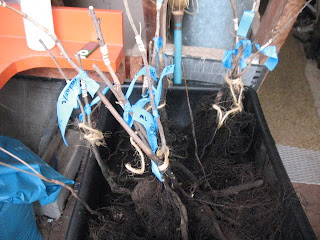G'evening -
Today was great. I woke up rather early and departed for Southampton to go work for Steve Breyer at
Tripple Brook Farm. I arrived at 10am and the day began by walking outside with Steve to his persimmon trees. We cut some branches from an on-site persimmon tree (variety 'yates') and brought the cuttings inside to the greenhouse, which is attached to his house. A description of the Yates persimmon:
"Introduced by Edward Yates of Cincinnati, OH, the original tree was discovered in a pasture in southern Indiana. Bears large, yellow, sweet fruit with fine flavor. Hardy, prolific and very early ripening, the fruit ripens here during October. Very unusual for an American persimmon, the mature but still green and firm fruit will ripen well off the tree; this suggests commercial marketing possibilities. Also, in areas where the growing season is too short to allow ripening the fruit on the tree, the mature fruit can be picked before freezing damages it and it can then be ripened indoors. It is said that this cultivar will bear seedless fruit if grown without a pollinator, so growing it without a pollinator may be advantageous."
Steve brought out some American persimmon (Diospyros virginiana) sapplings that he purchased from a plant nursery in Montana and then we began bench-grafting.

The American persimmon sapplings, packaged in a trash bag with wet newspaper for moisture and humidity control.

Healthy looking roots.
First, the area was sterilyzed with some rubbing alcohol. This is done to decrease the chances of pathogens affecting the newly grafted trees. We sterilyzed our hands, the razors, sissors and desk we were working on. We then sharpened the razors so that we could make the cleanest possible slices (increasing the likelihood of a successful graft.)
Here are some pictures of our work:



Looking proud after hours of grafting. I learned from a very knowledgable and experienced grafter - more than 7 hours was spent doing whip-grafting today, which is different from splicing.
Images taken from:
http://www.wvu.edu/~agexten/hortcult/treeshru/whipgrftg.htm
More persimmon grafting, but of a different variety, "szoukis."
I left Tripple Brook around 6:15pm with some witchhazel branches (soon will be flowering red in my kitchen) and a bunch of black walnuts that Steve harvested in the fall and gave to me. I also made about $15/hour in plant credit. Tripple Brook has a great system where anyone can go and work there in exchange for plants. Labor is so appreciated in the nursery business, says Steve, that he is thrilled when anyone takes him up on that offer. Myself, being in the position I am with 5000 square feet of unplanted garden (a bit overwhelming at times!)... I need all the plant credit I can! Therefore, I'll continue to work at Tripple Brook Farm for the next few months - at least one day per week - accumulating credit and eventually bringing home a car-full of plants for the 3 Willow Lane permaculture edible forest garden.
Isn't it great when everyone benefits? Humans are definitely social beings that work much better together, in community, than separate from one another.

It's great being surrounded by plants in the coldness of winter.

Especially when there's fig trees...

...and some hardy banana trees as well!


 Alex and Marty admiring a cactus plant!
Alex and Marty admiring a cactus plant! Mysterious!
Mysterious! This is another woman who was working for plant credit at Tripple Brook, Kate.
This is another woman who was working for plant credit at Tripple Brook, Kate. Starting the grafting, after learning some stone sharpening!
Starting the grafting, after learning some stone sharpening! We were grafting 'Szukis' (variety) scions onto the american persimmon rootstocks.
We were grafting 'Szukis' (variety) scions onto the american persimmon rootstocks. We accomplished quite a bit in the 5+ hours we stayed. I'll begin posting regularly each week (on Monday or Tuesday) stating which organization I'll be volunteering at on which day. I'd love for more of you to join, so please e-mail me if interested in permaculture, perennial plants, natural building, straw bale construction, intentional community living, ecovillages, (keyword plugging!), compost, nuestras raices, sirius community, tripple brook farm!
We accomplished quite a bit in the 5+ hours we stayed. I'll begin posting regularly each week (on Monday or Tuesday) stating which organization I'll be volunteering at on which day. I'd love for more of you to join, so please e-mail me if interested in permaculture, perennial plants, natural building, straw bale construction, intentional community living, ecovillages, (keyword plugging!), compost, nuestras raices, sirius community, tripple brook farm!




























